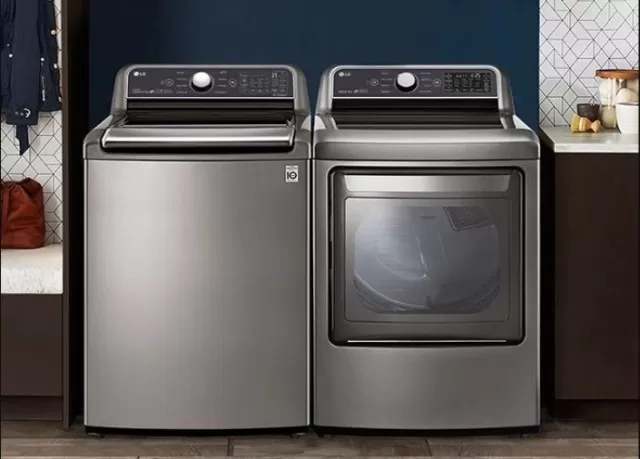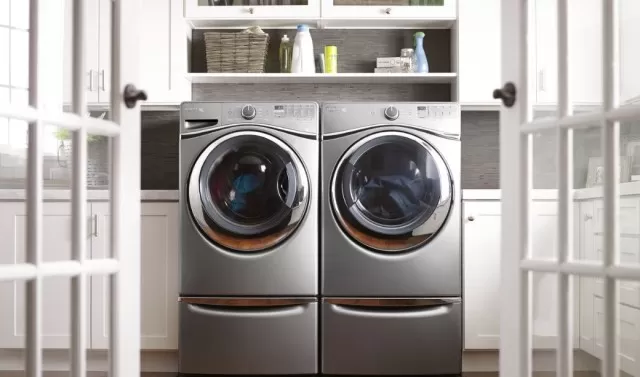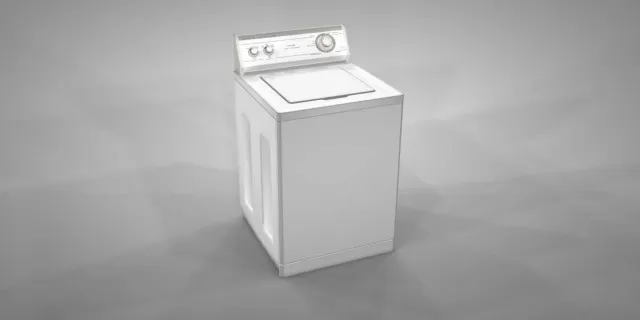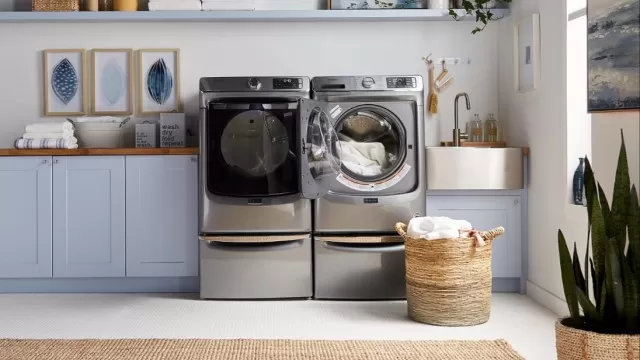While front-load and top-load washers/washing machines may appear similar, their benefits and drawbacks extend beyond mere style.

Each type of washing machine has its advantages and disadvantages, but determining the ideal washer for your family ultimately relies on individual preferences and lifestyles.
Several factors, such as cost, energy efficiency, and load capacity, should guide your decision-making process. In this regard, experts in appliances and laundry offer valuable advice on selecting the appropriate washer for your family, comparing front-load and top-load washing machines.
Front-Load Washer

A Front-Load Washer is?
A front-load washer refers to a washing machine that features a door on the front through which clothes can be loaded.
These washers utilize a horizontal drum that rotates to clean the clothes. Front-load washing machines are well-known for their efficiency, gentle cleaning, and ability to handle large laundry loads.
They are also designed to be stackable, making them a popular choice for maximizing space in smaller homes. According to Nick Evans from Home Appliance Hero, front-load machines are specifically engineered to use less water and consume less electricity, making them more energy-efficient compared to top-load washers.
By reducing water and energy consumption, front-load washing machines are considered environmentally friendly and can help homeowners save on their water and utility bills. Generally, when comparing front-load and top-load options, front-load washers are considered the more eco-friendly and cost-effective choice.
Advantages of a Front-Load Washer
One of the benefits of front-load washers is that they are often praised for providing a superior clean to clothes.
Evans explains that the tumbling action of front-load washing machines lifts and drops clothes, allowing for a more thorough cleaning process. Many front-load washers are equipped with advanced wash settings and technology, ensuring fresh and clean clothing.
Richard Tarrant, Senior Vice President of Dish & Laundry Care at BSH Home, adds that due to their tumbling motion, front-load washers are typically gentler on clothes and more effective at removing stains. Additionally, front-load washers often have higher spin speeds, which extract more water from the clothing, reducing drying time.
Front-load washers are particularly suitable for smaller spaces such as condos and townhomes.
Their flexible design allows for side-by-side configuration or stacking on top of a dryer, making them ideal for optimizing space. Furthermore, their versatile design offers increased interior design possibilities for any laundry room.
Top-Load Washer

Top-Load Washer is?
A top-load washer is a type of washing machine that is considered more traditional in design.
It features a vertical drum where clothes are loaded through a door located on the top of the machine. During the wash cycle, the vertical drum agitates and moves the clothes to clean them.
Advantages of a Top-Load Washer
One of the advantages of top-load washing machines is that they typically have shorter wash cycles compared to front-load machines.
They are also well-suited for smaller loads, making them a suitable choice for smaller households or individuals with less laundry. Another convenience of top-load machines is that they often allow users to pause the wash cycle to add or remove clothing, providing flexibility in the middle of a wash.
Additionally, top-load washing machines are generally less expensive than front-load machines, making them a more affordable option for those on a budget.
In terms of usability, top-load washers are easier to operate compared to front-load machines.
There is no need to bend down to load or unload clothing, which can be more comfortable for the back and knees.
Furthermore, top-load washing machines are more common and readily available in the market, making them easier to find, purchase, and potentially repair or replace when needed.
The Best Washer for Your Home

When selecting the right washer for your family, there are several factors to consider:
Costs
Take into account the upfront cost of the washer as well as the long-term savings on water and utility bills.
Front-load washers tend to be more expensive initially but can be more energy- and water-efficient, resulting in potential savings over time. Top-load washers are generally less expensive upfront but may not offer the same long-term cost savings.
Laundry space
Evaluate the available space in your laundry room or area.
Consider the dimensions and configuration of the washer, especially if you have limited space. Front-load washers are stackable and allow for more flexible installation options, while top-load washers typically require less bending and can be a better fit for smaller spaces.
Typical load size
Think about the average amount of laundry your family generates.
If you have larger loads, a front-load washer with a larger capacity may be beneficial. On the other hand, if you have smaller loads or prefer to do laundry more frequently, a top-load washer with a smaller capacity might be sufficient.
Personal preference and aesthetics
Consider your personal preferences and the overall aesthetic you desire for your laundry room.
Some individuals may prefer the look and feel of a front-load washer, while others may prefer the traditional design of a top-load washer. Factor in your own preferences and what aligns with your home’s style.
Maintenance
Keep in mind that front-load washers may require more maintenance compared to top-load washers.
The rubber seal on the door of front-load washers can accumulate water, mold, and mildew if not cleaned properly. Consider your willingness to perform regular maintenance tasks and ensure proper cleaning to prevent any issues.
Energy efficiency
Look for the ENERGY STAR label when choosing a washer.
This certification indicates that the appliance meets energy efficiency standards without compromising functionality. Opting for an energy-efficient washer can help reduce environmental impact and save on energy costs over time.
By considering these factors, you can make an informed decision and choose the washer that best suits the needs of your family, budget, and laundry preferences.
*The information is for reference only.